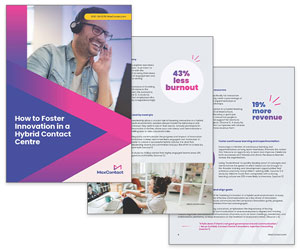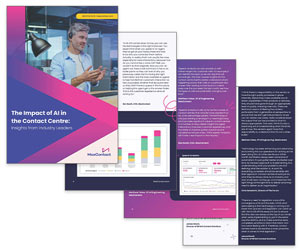Those working in contact centre roles say that work-related poor mental well-being is making them less productive, including answering fewer calls and taking more sick days – costing the industry over £990m in lost productivity every year.
That’s according to a new study, Duty of Care Gap, released today by customer engagement software specialists MaxContact.
The contact centre industry is a huge contributor to the UK economy, employing over 800,000 people across the country.
Yet the industry is facing a mental health crisis, with 83% workers saying their work is taking a toll on their mental well-being, with staff reporting high stress levels (62%), anxiety (48%) and feeling overwhelmed (46%).
This poor mental well-being at work is costing the industry millions in lost productivity at a time when staff attrition is already high.
An overwhelming majority (95%) say that work-related mental well-being problems are making them less productive at work, losing on average six hours of work per month, or nine working days per year to poor mental well-being.
This is also translating into sick days – staff report taking on average 2.78 sick days due to work-related mental well-being problems. This lost productivity is costing the industry £990 million per year.
Encouragingly, the research also reveals many businesses are already taking steps to help. Over half (52%) have mental health first aiders in place, but this is in stark contrast to physical health and safety, where each workplace is legally obliged to have nominated first aiders and carry out regular risk assessments.
For businesses that do prioritize the mental health of contact centre workers, the benefits are clear. The overwhelming majority (75%) of contact centre workers say they would be more likely to say in their current role if their employer made a bigger concrete commitment to improving mental well-being in their workplaces.
Also, 46% say they would consider another role in the contact centre industry if it would be better for their mental health.
To help those using their technology, MaxContact has launched a new Employee Wellbeing feature which provides helpful, unobtrusive tips throughout the day to help staff take steps to improve their physical and mental well-being while at work.
The reminders focus on three key areas: body position, hydration and positive mindfulness. Contact centre leaders can monitor anonymous, aggregated data on these actions to track how their staff are feeling and offer more support if needed.
Ben Booth, CEO at MaxContact, says, “Contact centre workers work unbelievably hard behind the scenes to make sure our society works. We’ve worked with contact centre leaders to understand the challenges the industry faces.
“What we’ve discovered shows just how difficult the job is. What’s more, the problem is only getting worse as the cost-of-living crisis gets even more serious and contact centre workers are the ones who have to deal with the angry or upsetting calls about rising costs.
“We’re calling for businesses that employ contact centre workers to make mental well-being just as important as physical health and safety, with properly trained mental health first aiders in every organization. It’s not just the right thing to do, it makes total business sense.
“We know we have a part to play too in making the industry better. That’s why we’ve launched our Employee Wellbeing feature as part of our making 2022 the year of the agent, focusing on both physical and mental well-being.
“It’s not an answer to the problem but it’s a step in the right direction and we’ll keep on looking for ways to put workers at the heart of our platform.”
Dr Andres Fonseca, Consultant Psychiatrist and Co-Founder at leading mental health care organization Thrive: Mental Wellbeing, threw his support behind the findings, saying, “Employee mental health can seem like a difficult topic to navigate but creating an environment that supports and educates staff has many advantages.
“It is vital that we equip all employees, but especially those in such frontline roles, with the necessary tools and techniques to effectively manage challenging conversations.
“With more focus on the cost-of-living crisis, it is also imperative that we continue to open up the conversation around mental health and raise more awareness of the connection between physical and mental well-being while ensuring that everyone across the workplace knows that they are valued and supported.”
Click here to read the full Duty of Care Gap report
For more information about MaxContact - visit the MaxContact Website
Author: MaxContact
Published On: 14th Jun 2022 - Last modified: 15th Jun 2022
Read more about - Industry News, MaxContact






 MaxContact is customer engagement software that goes above and beyond to build smarter customer experiences. Our platform is packed with powerful features, accessible for businesses large and small, and ensures organisations can operate compliantly.
MaxContact is customer engagement software that goes above and beyond to build smarter customer experiences. Our platform is packed with powerful features, accessible for businesses large and small, and ensures organisations can operate compliantly. 































